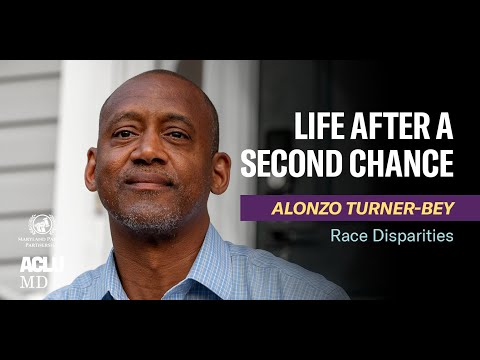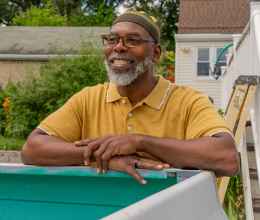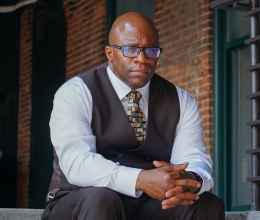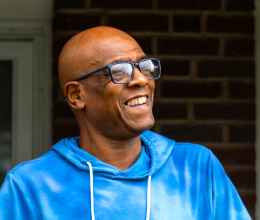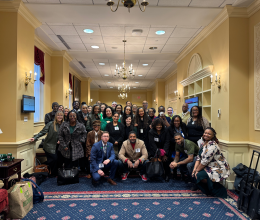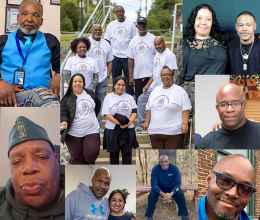
In Episode 5, “Alonzo Turner-Bey – Race Disparities” get to know Alonzo and his personal views on second changes. Alonzo spent over 31 years on the inside for a crime he committed as a young person.
Over the years, he educated himself, went to school, and began showing up for others even as an incarcerated person. Not only that, evidence shows that there is a serious race disparity among Black people who are incarcerated. Black people are incarcerated at nearly five times the rate of white Americans. And Black people make up less than a third of Maryland's population but account for 72.4 percent of state prisoners in 2023. Alonzo is fully aware of his own errors in his youth, but that doesn’t mean the legal system itself has corrected its own. Race plays an enormous role in the prison population and there’s no one better to tell that story truthfully and share the work he’s been doing to fix it, then Alonzo Turner-Bey.
Learn more:
Video by Nehemiah Bester. Portrait photos by Nicole McCann and other photos provided by Alonzo Turner-Bey.
TRANSCRIPT
00:00 – 00:08
Nehemiah Bester
Who is Alonzo Turner-Bey?
00:08 – 00:22
Alonzo Turner-Bey
Alright, Alonzo Turner-Bey, 53 years old, family man. Caring, kind, you know, goal driven, community activist. That's who I am.
00:24 – 00:41
Alonzo Turner-Bey
I was incarcerated for 31 years, six months, 16 days, and five hours for a crime that I committed when I was a juvenile. While I was in prison I educated myself, went to school. Got active in the legislative process, and I became a community advocate.
00:43 – 00:49
Nehemiah Bester
Tell me, why do you think Black people are incarcerated at such a high rate?
00:49 – 01:07
Alonzo Turner-Bey
Prison is the new Jim Crow slavery of today. America was built off of men and women who look like me. Racism ain't something that’s just born in America overnight. This is something that’s been going on for a long period of time.
01:07 – 01:25
Alonzo Turner-Bey
And so the racism has been so ingrained in the states, inside the counties, inside the cities, inside the municipalities, that it's like an everyday fiber thing. It can't function without racism, whether it's overt or covert.
01:25 – 01:37
Alonzo Turner-Bey
So, you know, you get the furniture industry, you get the chemicals that are made to clean up, in prison. All the colleges, all the state office buildings, all of their furniture are made by prisons.
01:38 – 1:57
Alonzo Turner-Bey
So, they are getting free labor and not just in the state of Maryland, but throughout the country. The same way in slavery. So long as I keep the prison industrial complex rolling, the states benefit. And who are the most vulnerable people? Those people who look like me.
01:59 – 02:16
Alonzo Turner-Bey
When I first came out, I worked with a nonprofit organization called F.R.E.S.H. - Fully Restoring Every Sons Hope. That nonprofit is geared towards helping men and women who return back to Prince George's County. Help them reacclimate themselves back into the community.
02:16 – 02:30
Alonzo Turner-Bey
Doing food drives, doing coat drives, clothing drives, helping the homeless, the less fortunate. But at the end of the day, man, to see my family proud. See them smile. See them happy.
02:30 – 02:43
Alonzo Turner-Bey
See the people in the community that I helped, do better with the things I'm able to help them with and move their life forward, man. It just brings my heart with joy.
02:43 – 02:45
Nehemiah Bester
What do you enjoy about life right now?
02:45 – 02:48
Alonzo Turner-Bey
Living. I live life, enjoy life. One day I hope to get married. I’d like to have a family. So, you know, it’s the small things in life that some people take for granted. Men and women who have been incarcerated, enjoy those small things, man.
03:00 – 03:03
Alonzo Turner-Bey
It's the small things in life. You know, that bring sunshine and hope, to individuals like me. Enjoy the small things man, because they mean a lot.
03:11 – 03:18
Alonzo Turner-Bey
I encourage everybody, man, smell the roses. Because if they are ever taken from you or you ever take them for granted, you lose them. You’ll wish you had them back again.
